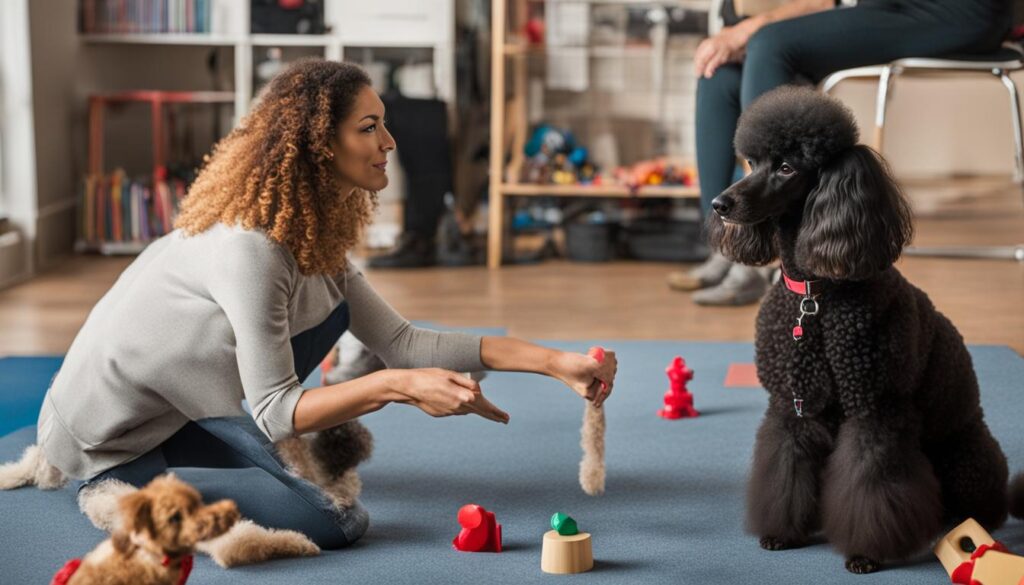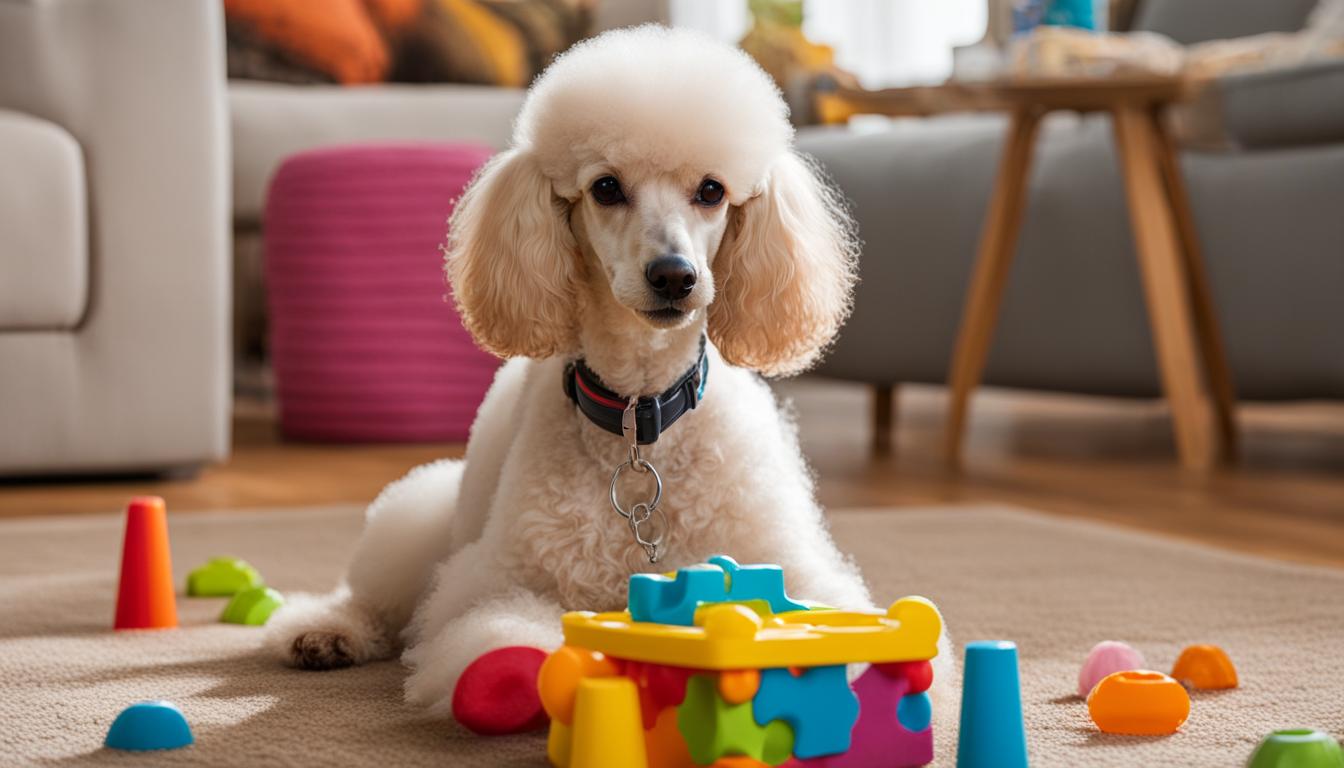As a poodle parent, you know that your fluffy companion’s bark can hold a symphony of messages—from excitement to alert. However, when the barking becomes the soundtrack of your daily life, it’s crucial to find effective methods to stop poodle barking that’s more noise than note.
But fear not, there are poodle barking solutions that won’t just mute the problem, but understand and address your dog’s needs. Managing poodle barking behavior requires patience, persistence, and a toolkit of strategies to ensure tranquility in your home. Let’s explore and apply the strategies that resonate with our poodles, transforming the cacophony into calm.
Understanding your poodle’s barks means tuning into their specific motivations and triggers. Each bark can be a clue to their wellbeing, and whether they require more exercise, mental stimulation, or reassurance. By utilizing an approach that caters to your poodle’s unique perspectives, you’ll discover the harmony of peaceful days and quiet nights. Learn how to stop a poodle from barking, not just for the silence, but for a deeper bond with your furry friend.
Key Takeaways
- Identifying the reasons behind barking is essential for effective poodle barking solutions.
- Implementing a routine with ample exercise and stimulation can manage poodle barking behavior.
- Avoid negative reinforcement; it’s about understanding, not silencing our poodles.
- Consistency is key in training to ensure lasting results and a happier poodle.
- With the right poodle training, peace and quiet won’t just be an occasional guest but a permanent member of the household.
Understanding Why Poodles Bark Excessively
Every poodle has its own set of vocal expressions, and it’s not uncommon for these intelligent dogs to vocalize their emotions. However, when the melody of barks becomes a relentless noise, it’s time to understand what’s behind the excessive outbursts. By distinguishing between different types of barking, identifying common triggers, and examining breed-specific characteristics, poodle owners can find effective methods to stop poodle barking that goes beyond the occasional alarm or greeting.

Differentiating Between Normal and Excessive Barking
Conversations with canines are possible, just not with words. A bark here or there often means your poodle is communicating normally. That communication turns into concern when the barking is excessive and extends over long periods or occurs in inappropriate situations. Constant noise can be stressful for both the dog and owner, which is why identifying whether your poodle is simply ‘talking’ or desperately ‘yelling’ is the first step to achieving quiet.
Identifying Common Poodle Barking Triggers
Poodles are like symphonies with a boundless range of barking motivations—from a surprising doorbell chime to the lonesomeness of an empty home. Uncovering these triggers lays the groundwork for controlling poodle barking with patience and precision. It’s akin to a maestro understanding the unique instruments in their orchestra—know your poodle’s barks and you can lead them with confidence and clarity.
Assessing the Role of Breed-Specific Traits
Techniques to curb poodle barking tap into the breed’s inherent traits—intelligence and sensitivity. These attributes make poodles wonderfully trainable but also susceptible to overstimulation from their environment. By understanding breed-specific traits, poodle owners can shape their approach to managing barking behavior effectively. This alignment between breed tendencies and training strategies is essential to ensure that poodles can live harmoniously within the family home, providing peace for all.
Implementing a Consistent Training Regime
To answer the often-asked question of how to stop excessive poodle barking, it’s essential to establish a consistent poodle training regimen. Just as musicians practice regularly to master their instruments, poodles require systematic training to reduce barking. Such a regimen should blend regular physical activity, social encounters, and mental exercises to keep your poodle engaged and well-behaved. Understanding that a lack of consistency can lead to confusion and additional barking issues, it’s crucial to maintain a regimen that adapts to your poodle’s individual needs for a quieter and more harmonious living environment.
- Exercise: Poodles thrive on physical activity. Daily walks and playtime are fundamental to their well-being and can significantly diminish barking behaviors borne out of pent-up energy.
- Socialization: A well-socialized poodle is a confident and calm poodle. Introduce them to a variety of environments and personalities to avoid anxiety-induced barking.
- Mental Stimulation: Engage your poodle’s sharp mind with puzzle toys and training games that challenge their intellect and reduce boredom-related barking.
- Positive Reinforcement: Rewarding your poodle for quiet behavior enforces the idea that silence can be more beneficial than barking, and is a cornerstone among techniques to curb poodle barking.

Adherence to these principles is just the beginning. Let’s inspect how these components can be blended into a structured weekly schedule that makes poodle training to reduce barking both manageable and enjoyable for you and your furry friend.
| Day of the Week | Exercise | Socialization | Mental Stimulation | Positive Reinforcement Practice |
|---|---|---|---|---|
| Monday | Morning Jog | Park Visits | Puzzle Feeder | Treats for Quietude |
| Tuesday | Fetch in the Yard | Outdoor Café Socializing | Treat-Hide-and-Seek | Affection for Calm Responses |
| Wednesday | Agility Exercises | Introducing New People | Interactive Toy Sessions | Praise for Silence during Meals |
| Thursday | Swimming Session | Meeting Friendly Dogs | Obedience Training | Clicker Training for Quiet Behavior |
| Friday | Hiking Adventure | Errands in Public Spaces | DIY Obstacle Course | Playtime for Not Barking at Doorbell |
| Saturday | Tug-of-War | Family Gatherings | New Trick Learning | Special Treats for Nighttime Quiet |
| Sunday | Relaxing Walk | Quiet Time at Home | Searching for Hidden Treats | Massage for Not Responding to Barking Dogs |
This schedule integrates various activities known to help in stopping excessive poodle barking. By consistently applying this schedule, you will notice a significant change in your poodle’s barking habits. The goal is a content, engaged, and yes, quiet poodle companion who knows there are more rewarding ways to communicate than persistent barking.
How to Stop a Poodle from Barking
Excessive barking in poodles can disrupt the peace of your household and cause stress for both you and your pet. Understanding and addressing the root cause of your poodle’s vocal outbursts is crucial when looking for long-term solutions. In this segment, we delve into time-tested strategies that prompt silence, reward calmness, and acclimatize your poodle to potentially stress-inducing stimuli. By incorporating these tips to prevent poodle barking into your routine, you’re on the path to a quieter, more serene home life with your beloved canine companion.

The Power of Positive Reinforcement
Positive reinforcement is the linchpin of modern dog training, including techniques to curb poodle barking. Rather than punishing your poodle for their barking—which often leads to fear and confusion—rewarding them for moments of silence can reinforce quiet behavior. This method involves recognizing and praising the desired behavior at the right moment, thereby encouraging your poodle to associate silence with positive outcomes, such as treats or affection.
Teaching the “Quiet” Command
Training your poodle to understand and obey the “Quiet” command is an effective way to stop excessive barking. Start by clearly saying “Quiet” in a calm, firm voice when your poodle is barking. As soon as they stop, even for a brief moment, reward them with a treat or affection. It’s essential to be patient and consistent with this approach, positively reinforcing their compliance each time, to help your poodle learn that silence is rewarded.
Adopting Desensitization Techniques
Another core strategy involves desensitization, a technique designed to make your poodle less reactive to stimuli that trigger barking. For example, slowly introducing your dog to recorded sounds like thunderstorms at a low volume, and gradually increasing the volume over time, helps to minimize their stress response to such events. By consistently exposing your poodle to their triggers in a controlled manner, you can effectively diminish their inclination to bark excessively in response.
These approaches to training require dedication and understanding of your poodle’s needs and behaviors. When applied consistently, they offer effective methods to stop a poodle from barking unnecessarily, fostering a calmer environment for everyone involved.
We have developed an extensive list of tips and tricks to stop dogs barking, this is also a great read and can be found here.
Physical and Mental Stimulation for Your Poodle
To stop excessive poodle barking, key strategies include not just physical exertion but also mental engagement. Providing your poodle with a blend of both types of activities can significantly reduce the chances of nuisance barking triggered by boredom or excess energy. Here’s how you can establish a routine that caters to both the physical agility and sharp intellect of your poodle.
Designing an Exercise Routine Tailored for Poodles
A well-considered exercise routine is essential for managing poodle barking behavior. Begin by scheduling daily walks that allow your poodle to expend energy and explore. This can be supplemented with interactive play sessions that stimulate both their body and mind, such as fetch or tug-of-war games. Another valuable addition is a dog treadmill, especially useful during inclement weather, ensuring your poodle gets sufficient physical activity. Aim for a mix of these activities throughout the week to keep your poodle’s routine varied and exciting.
| Day | Activity | Duration |
|---|---|---|
| Monday | Morning Walk | 30 minutes |
| Tuesday | Fetch Game | 20 minutes |
| Wednesday | Dog Treadmill | 15 minutes |
| Thursday | Obstacle Course Play | 25 minutes |
| Friday | Evening Jog | 40 minutes |
| Saturday | Interactive Toy Play | Varies |
| Sunday | Leisurely Park Visit | 1 hour |
Engaging Poodles with Interactive Toys
Intellectual stimulation is just as crucial in curbing unnecessary barking. Invest in a collection of interactive toys like puzzle feeders and treat-dispensing balls that challenge your poodle’s intellect and cater to their inquisitive nature. Toys that encourage problem-solving can keep them occupied for long periods, effectively providing tips to prevent poodle barking.
- Puzzle Toys: These require your poodle to solve puzzles to get treats, which stimulates their brain.
- Scent Tracking Games: Hide treats around the house and let your poodle hunt them down.
- Interactive Feeders: Turn mealtime into a game and help your poodle eat slower while having fun.

Socializing Your Poodle to Reduce Anxiety-Induced Barking
Frequent barking can be problematic for poodle owners, but with the right tips to prevent poodle barking, it becomes manageable. Socialization stands as a powerful technique in managing poodle barking behavior effectively. Here, we explore how social encounters and environment exposure can lay the groundwork for your poodle’s calm demeanor.

For poodles, who are known for their intelligence and alertness, proper socialization is key to prevent them from barking incessantly. Early and consistent exposure to a variety of social scenarios can make all the difference. These experiences help your poodle to feel confident and less stressed when encountering new people, pets, and environments, thus reducing their need to communicate through barking.
Here are some practical actions you can take to socialize your poodle effectively:
- Introduce Your Poodle to New People: Regularly arrange meet-ups with friends, family, and neighbors to cultivate your dog’s comfort with visitors.
- Explore Various Environments: Take your poodle to different places like parks, pet-friendly stores, and urban streets to broaden their experiences.
- Attend Doggy Daycare or Playdates: Plan for group interactions with other dogs to promote social skills and diminish anxiety.
- Enroll in Training Classes: Join structured classes for disciplined learning and controlled exposure to diverse stimuli.
- Positive Meeting Experiences: Always make sure new introductions are rewarding and pleasant to reinforce good behavior.
Implementing structured socialization should be part of your tactics to stop your poodle from barking incessantly. To illustrate the benefit of a considered approach to socialization, let’s examine a weekly socialization plan that encourages a wide array of positive interactions:
| Day | Activity | Goal | Outcome |
|---|---|---|---|
| Monday | Walk in a New Neighborhood | Exposure to Novel Sights/Sounds | Reduced Reaction to Environmental Changes |
| Tuesday | Visit to Pet Store | Interaction with Strangers and Animals | Increase Comfort with Various Humans/Animals |
| Wednesday | Puppy Playdate | Immersion in Group Dog Dynamics | Better Dog-to-Dog Communication |
| Thursday | Training Class Participation | Learning in a Controlled Group Setting | Improved Response to Commands |
| Friday | Outdoor Café Sitting | Calmness in Busy Public Areas | Less Stress with Public Distractions |
| Saturday | Family Gathering Visit | Interaction with Extended Family | Familiarity with Large Group Etiquette |
| Sunday | Quiet Time at Home | Adaptation to Both Social and Solitary Scenarios | Balanced Behavioral Expectations |
This schedule is designed to empower your poodle to become more adaptable, thus preventing anxiety-induced barking. Mixing daily routines with new and stimulating experiences encourages a well-rounded disposition in your poodle, making each day an opportunity to learn, adapt, and ultimately, live more quietly alongside you.
Creating a Calming Environment at Home
For poodle owners seeking to stop excessive poodle barking, creating a serene atmosphere within your home can be a cornerstone in your poodle’s behavior management. By managing your household surroundings to cater to your poodle’s comfort, you curtail stress triggers that provoke barking, leading to a more tranquil home life for you and your pet.

Managing Your Poodle’s Surroundings
One of the primary techniques to curb poodle barking is managing the environment in which your poodle spends most of their time. Simple steps, such as drawing the blinds, can prevent visual triggers from exciting your poodle and leading to nuisance barking. Creating a “safe space” in your home where your poodle can retreat to when feeling overwhelmed is another effective strategy. This designated area could include comforting blankets, favorite toys, and even an article of clothing with your scent to help quell their anxiety.
Using Sounds and Scents to Soothe Your Poodle
In the quest to stop excessive poodle barking, the ambience of your home plays an integral role. A gentle, consistent auditory background, like soft music or a sound machine emitting calming noises, can mask erratic noises from outside and create an aura of calm. Additionally, the use of certain scents, such as lavender or chamomile, has been known to have a soothing effect on canines. A diffuser or a scented candle safe for pets can disperse these calming aromas, contributing to a peaceful environment that encourages your poodle to relax instead of bark.
Initiating these strategies as part of poodle training to reduce barking not only provides immediate relief from noise but also conditions your poodle to adopt a quieter, more composed demeanor. It’s key to remember that a dog’s environment heavily influences their behavior. Thus, a calm home can help foster a calm poodle.
Controlling Barking with Canine Good Citizen Training
For those seeking poodle training to reduce barking, the American Kennel Club’s Canine Good Citizen (CGC) program is an exemplary path to consider. Establishing a discipline of quietude in a breed known for its expressiveness can be quite the endeavor. However, the structured training offered by the CGC program sets both owner and poodle on a journey towards achieving a serene coexistence. By fostering an understanding of appropriate behavior, poodles are taught the invaluable distinction between necessary vocalization and incessant barking.

Responsible ownership is at the crux of the CGC program-with a syllabus that encourages consistency and patience, essential ingredients in effective methods to stop poodle barking. Training under this program adheres to comprehensive standards that don’t merely aim to stop poodle from barking incessantly but to instill a greater understanding of the underlying causes of such behavior.
| CGC Training Component | Impact on Barking |
|---|---|
| Obedience Commands Mastery | Forms the basis for instructing quiet behavior |
| Socialization Skills | Reduces anxiety-related barking in diverse scenarios |
| Understanding Canine Body Language | Helps owners recognize and address stress signals before barking starts |
| Exposure to Various Environments | Equips poodles to remain calm and quiet in different settings |
| Focus on Positive Reinforcement | Encourages behaviors that lead to less vocalization |
The CGC’s comprehensive approach covers aspects such as reaction to other dogs, response to distractions, and accepting a friendly stranger. Each of these areas can contribute to a tendency to bark, and through certified training, can be significantly managed. The program’s multifaceted components collaborate to develop a poodle’s confidence, discipline, and understanding of when it is suitable to express vocally and when it’s more appropriate to observe quietly. This balance is crucial for a dog’s well-being and a peaceful home environment.
- Poodles learn to navigate the world with fewer stressors that prompt barking.
- Certified trainers assist in customizing tactics to each dog’s temperament and needs.
- The CGC title is a testament to a poodle’s ability to behave well in the community.
Owners invested in poodle training to reduce barking will find the structure and support of the CGC program an indispensable asset. Through its established criteria, poodles are instilled with the skills to handle their impulses and communicate in ways that reflect their innate intelligence rather than their volume. Achieving the CGC title represents not just an accolade, but a significant milestone in the journey towards effective canine communication and the tranquility that accompanies it.
When to Seek Professional Help for Your Poodle’s Barking
While there are many strategies that poodle owners can employ to stop excessive poodle barking, there are instances when professional intervention is the best course of action. Understanding the difference between typical behavior and problematic barking is critical to ensuring the well-being of your poodle. If your efforts in poodle training to reduce barking have not yielded the desired tranquility, it may be time to consider the assistance of a professional trainer or behaviorist. This approach is particularly beneficial for addressing complex issues that may not be solvable through general training methods alone.
Identifying Barking Related to Behavioral Issues
Barking can be symptomatic of underlying issues that need more than just training to resolve. Behavioral concerns like aggression, severe separation anxiety, or acute fear can manifest in persistent barking patterns. Early identification of such conditions is vital for the successful implementation of corrective strategies. It is essential to take note of cues—such as the context in which your poodle barks and changes in body language—that hint at deeper behavioral challenges. Only then can you formulate an approach that will effectively help you how to stop a poodle from barking when it stems from such intricate behavioral roots.
Choosing the Right Trainer or Behaviorist
Finding the right professional is crucial when addressing your poodle’s barking issues. Look for experienced trainers or behaviorists who specialize in poodles or similar breeds. Their expertise in breed-specific behavior, combined with a commitment to positive reinforcement techniques, makes them well-equipped to devise a customized plan to stop excessive poodle barking. When evaluating potential trainers, consider their qualifications, training philosophy, and testimonials from other poodle owners. Each professional’s approach can differ, and selecting one that aligns with your views on canine training is vital for a partnership that benefits your poodle and brings about the quiet environment you aspire to have at home.

Conclusion
In the harmonious journey of cohabiting with your poodle, understanding what prompts their barking proves indispensable. Both a symphony and challenge, the act of controlling poodle barking requires a blend of discernment and dedication. The effective methods to stop poodle barking span beyond simple commands, embracing a comprehensive blueprint of exercise, mental enrichment, and the serenity of a well-managed environment. These poodle barking solutions are not about stifling a poodle’s inherent traits but rather directing their energy and intelligence into more acceptable forms of expression.
Consistency remains pivotal in the process to stop poodle from barking incessantly. With the right approach, tailored to individual triggers and needs, your poodle can learn the appropriate times to use their voice and when to enjoy the quiet. Professional guidance might also play a role in refining your training strategy, especially when you face hurdles that seem insurmountable alone. Integrating professional advice with accountable pet ownership can dramatically reshape your poodle’s behavioral landscape.
Ultimately, it’s the union of love, patience, and strategic intervention that forges the path to a quieter home. Commit to the process, and celebrate the milestones, no matter how small they may seem. The reward is a tranquil coexistence with your poodle—a cherished companion whose silence can be just as golden as their bark.
FAQ
How can I differentiate between normal and excessive poodle barking?
Normal barking is usually a poodle’s way of communicating specific needs or responses to common stimuli, while excessive barking is frequent or prolonged noise that seems to lack a clear purpose or occurs in inappropriate situations. Observe your poodle to determine the context and frequency of the barking to assess if it’s excessive.
What are common triggers that may cause my poodle to bark excessively?
Common barking triggers include environmental stimuli such as loud noises or passing strangers, perceived threats, loneliness, boredom, and separation anxiety. Paying attention to when your poodle barks can help pinpoint specific triggers.
Are breed-specific traits a factor in my poodle’s barking behavior?
Yes, breed-specific traits can influence a poodle’s propensity to bark. Poodles are intelligent and alert dogs that may bark more in response to their environment or due to a lack of mental stimulation. Understanding these traits can help you address the root causes of unwanted barking.
What does a consistent training regime for a poodle involve?
A consistent training regime for a poodle includes regular physical exercise, socialization, mental stimulation, and positive reinforcement for desired behaviors. It should be structured, adaptable to the dog’s needs, and avoid negative responses to prevent confusion and further behavioral issues.
How can positive reinforcement help stop my poodle from barking?
Positive reinforcement involves rewarding your poodle for remaining quiet, rather than punishing barking. By consistently rewarding periods of silence or calmness, your poodle will learn that not barking is a behavior that gets them positive attention and rewards.
How can I teach my poodle the “Quiet” command?
To teach the “Quiet” command, wait for your poodle to bark, say the command calmly and firmly, and then immediately reward them with a treat when they stop barking. Repeat this process consistently until your poodle learns to associate the command with the desired silence.
What are desensitization techniques, and how can they be used to stop poodle barking?
Desensitization techniques involve gradually exposing your poodle to the stimuli that trigger barking, starting at a low intensity and slowly increasing it while maintaining your dog’s calm behavior. Over time, your poodle should learn to respond less intensely to these triggers.
What kind of exercise routine should I design for my poodle to prevent barking?
An exercise routine for a poodle should include activities that burn off energy and engage their intelligence. This can include walks, interactive games, agility training, or even a dog treadmill if traditional exercises aren’t enough. The goal is to tire them out physically and mentally to prevent boredom-related barking.
How can interactive toys help manage my poodle’s barking?
Interactive toys provide mental stimulation for your poodle, satisfying their innate curiosity and intelligence which helps prevent boredom, a common cause of barking. Toys like puzzle feeders, treat-dispensing gadgets, and interactive playthings can keep your poodle occupied and quiet.
Why is socializing important in preventing my poodle from barking incessantly?
Socializing exposes your poodle to various situations, environments, and people, which can help them become more confident and less anxious. A well-socialized poodle is less likely to bark due to fear or unease in new situations, thus reducing anxiety-induced barking.
What can I do at home to create a calming environment for my poodle?
To create a calming environment, manage your poodle’s surroundings by minimizing exposure to external stimuli that could trigger barking. Use sound like soft music or a radio to provide a comforting background noise, and consider calming scents or pheromones to help your poodle relax. Ensuring a peaceful home can reduce stress and barking.
How can the American Kennel Club’s Canine Good Citizen program help control my poodle’s barking?
The Canine Good Citizen program sets a standard of behavior for dogs, including when it’s appropriate to bark. By following its training guidelines, your poodle can learn self-control and good manners, which can reduce unnecessary barking.
When should I seek professional help for my poodle’s barking behavior?
If your poodle’s barking persists despite consistent training, or if it’s related to aggression or severe separation anxiety, seeking professional help is advised. A trainer or behaviorist with experience in poodles and a positive approach can offer personalized strategies to manage the barking.
How do I choose the right trainer or behaviorist for my poodle?
Look for professionals with specific experience working with poodles and a commitment to positive reinforcement techniques. Check their credentials, ask for references, and discuss their approach to barking behavior to ensure they’re a good fit for your needs and your dog’s temperament.






